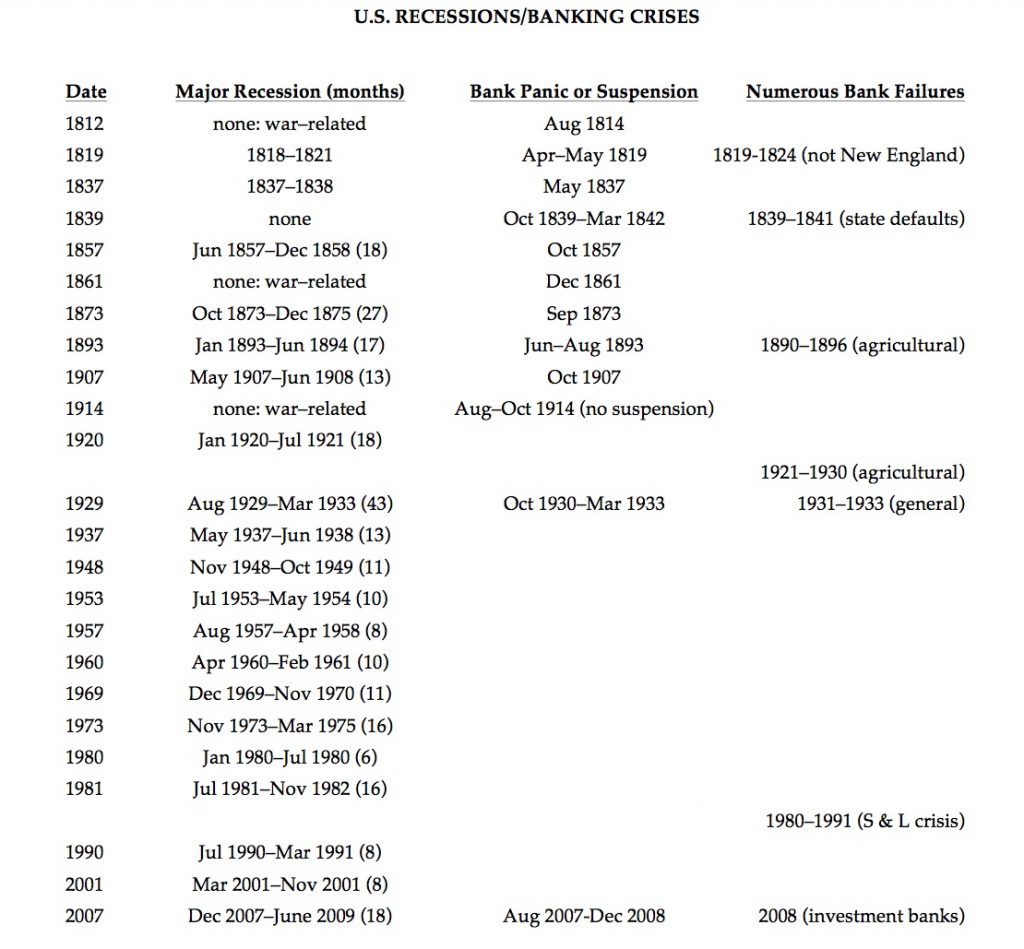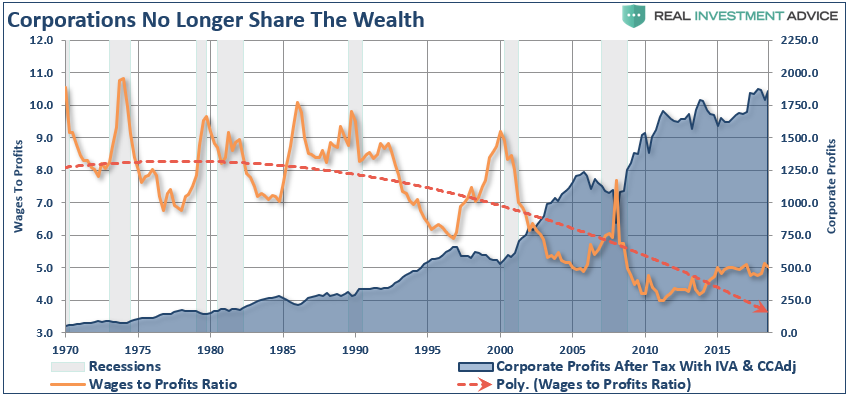“Capitalism” is not the same as “Corporatism.” Yet, whenever you mention capitalism, there is palpable anger arising from a fundamental widespread misbelief.
“‘Evil’ corporations are greedy and take advantage of the system for their benefit.”
I have two words for you – “No S***.”
Such does not mean capitalism has become “broken.” On the contrary, capitalism created the opportunity for corporations to exist. Things went wrong when corporations took advantage of the system.
However, that isn’t their fault. It is yours and mine.
As the saying goes, “Don’t hate the player. Hate the game.”
Let’s explore the differences, the problem, and the solution.
Capitalism Isn’t Broken.
I recently took a poll about “capitalism.”
Is capitalism, as we know it, dead?
— Lance Roberts (@LanceRoberts) June 14, 2021
There is a generally false assumption about capitalism.
“Corporations are hugely profitable but fail to share the fruits of capitalism equitably.
Let’s define what “capitalism” is and isn’t.
Capitalism is an economic system of property rights, the rule of law, and free markets. As such, capitalism allows ANY individual to create wealth.
“Properly understood, [capitalism] provides a level playing field for entrepreneurs to offer goods and services producing incomes and profits. I don’t think equitably distributing ‘profits’ is capitalism’s role.
Ensuring that all participants get treated fairly and, to some extent, regulating these personal and corporate endeavors, is the role of society in general and government in particular.
So when you say that capitalists are not very good at sharing profits, I would say that capitalism did not get designed to do so.” – John Mauldin
Therefore, an economic system that equally shares profits, goods, and services is not “capitalism.”
It is “Socialism.”
Furthermore, let’s understand what these debates are really about. The debates over capitalism aren’t about Mike Jones, who operates the local auto mechanic repair shop. Nor Annie Smith, the operator of a personal training studio. Mike and Annie are taking advantage of a capitalist economy. Capitalism provides the ability to earn more wealth than paid employment.
Mike and Annie took significant risks as entrepreneurs and expended capital in the process. There were no guarantees of success when they ground out 50-70 hours work weeks. Should Mike and Annie now get forced to share the fruits of the labor with everyone else who did not take those same risks?
It’s pretty obvious the answer is “no.”
How Wall Street Ate CapitalismThe debate should be focused on the “distortion of capitalism” by Wall Street, or rather “corporatism.” Three main points in history changed the dynamic of capitalism to corporatism. The first was the repeal of the Glass-Steagall Act in 1999, which allowed the major banks to eat the world. The second was Clinton’s attempt to “fix” executive compensation, and lastly was the idea that taxpayers must bail companies out. Let’s start with the repeal of the Glass-Steagall. Leading up to the “1929 Crash,” banks acted as brokerage firms underwriting IPO’s, selling them to the investing public and providing them with “margin debt” to leverage up their buying. It was a vicious and predatory practice that fueled speculative greed and fostered the most significant “Ponzi” scheme in history. In 1933, Congress enacted the Glass-Steagall Act to combat over-reaching banking activities that led to financial instabilities and fueled the Great Depression. The legislation’s main thrust was to separate traditional banking activities from trading and investing practices. From 1933 until its repeal in 1999, the act prohibited banks that took deposits from trading and underwriting in non-government and non-investment grade securities. The act did not eliminate financial crises from occurring but did prevent another Great Depression. Notice the gap in bank panic or suspensions between 1929 and 2007. |
U.S. Recessions/Banking Crises, 1812 - 2007 |
The Mistake Of Repeal
In 1999, Congress passed the Gramm-Leach-Bliley Act (also comically known as the Financial Services Modernization Act of 1999), which repealed Glass-Steagall. The repeal, heavily lobbied for by the banking sector, was promoted to the public as a means to unleash bankers’ ability to provide more capital and liquidity to spur economic activity.
Less than ten years after the Gramm-Leach-Bliley Act was signed, financial institutions imploded to a degree not seen since the Great Depression. Without the lifeline of massive taxpayer-funded bailouts, unprecedented monetary policy, and questionable accounting standards changes, the financial carnage from the crisis of 2008 might have equaled or even surpassed that of the Great Depression. Ironically, it also revealed Bernie Madoff’s massive “Ponzi” scheme.
Coincidence? I think not.
The removal of Glass-Steagall has had negative impacts. It primarily resulted in shifting capital from those that consume and innovate to financial intermediaries. You may think it a trivial matter that financial institutions get subsidized and profit at the expense of others. For the bottom 90%, their resentment stems from being economically constrained while supporting the wealth of the top 1%.
Fixing Executive CompensationThe income gap is also not a problem of capitalism. Instead, it is the result of another Government intervention taken advantage of by Wall Street. In 1993, Bill Clinton made a valiant attempt to reign in CEO pay. Clinton thought, incorrectly, that by restricting corporations to expensing only the first $1 million in CEO compensation for corporate tax purposes, corporate boards would limit the amount of money they doled out to executives. To Bill’s chagrin, corporations quickly shifted executive compensation schemes with their Wall Street investment banking firms’ assistance to stock-based programs. Subsequently, CEO pay rose even faster, and the gap between profits and wages became vastly distorted. Rising profitability, fewer employees, and increased productivity per employee contributed to the surging “wealth gap” between the rich and the poor. |
Wages Profits Ratio, 1975 - 2020 |
According to a recent NY Times article:
“The divergent fortunes of C.E.O.s and everyday workers illustrate the sharp divides in a nation on the precipice of an economic boom but still racked by steep income inequality. The stock markets are up and the wealthy spend freely, but millions still face significant hardship. Executives are minting fortunes while laid-off workers line up at food banks.
The gap between executive compensation and worker pay is a decades-old problem.
According to the Economic Policy Institute, chief executives of big companies now make, on average, 320 times as much as their typical worker. In 1989, that ratio was 61 to 1. From 1978 to 2019, compensation grew 14 percent for typical workers. It rose 1,167 percent for C.E.O.s.
Executives at publicly traded companies receive most of their compensation in stock, an arrangement intended to align pay with the performance of a company’s share price.”
Share Buybacks Are The ProblemThe debate over share buybacks first came to the fore following the tax cuts in December of 2017. The bill targeted corporations and reduced tax rates from 35% to 21%. The plan got “sold” to the American public as a “trickle-down” plan. Indeed, giving money back to corporations would lead to hiring workers, increased wages, and investing in America. Unsurprisingly, that didn’t happen. Instead, the money primarily went to share buybacks.
A study by the Securities & Exchange Commission supports this claim.
We also see it in the actual data of record share buybacks coinciding with record insider selling. What is clear is the misuse and abuse of share buybacks to manipulate earnings and reward insiders is problematic. |
Buybacks vs Insider Sales |
It’s Not An Unsolvable Problem
The common misconception is those share buybacks are a “return of capital” to shareholders.
There is a problem with that statement.
Share buybacks only return money to those individuals who sell their stock. Such is an open market transaction. If Apple (AAPL) buys back some of their outstanding stock, the only people who receive any capital are those that sold their shares.
So, who are the ones selling their shares?
As noted above, it’s the insiders. Since the turn of the century, changes in compensation structures are heavily dependent on stock-based compensation. As a result, insiders regularly liquidate shares “granted” to them to convert them into actual wealth.
However, most forgot share buybacks previously were illegal. Via Vox:
“Buybacks were illegal throughout most of the 20th century because they were considered a form of stock market manipulation. But in 1982, the Securities and Exchange Commission did pass rule 10b-18, which created a legal process for buybacks. The rule opened the floodgates for companies to repurchase their stock en masse.”
If you want to fix “corporatism” without destroying “capitalism,” then fix the legislation. As William Lazonick noted via The Harvard Business Review:
“If Americans want an economy in which corporate profits result in shared prosperity, the buyback and executive compensation binges will have to end. As with any addiction, there will be withdrawal pains.”
In Part 2 – We will continue with why “bailouts” are a problem, not a solution.
The post #MacroView: Capitalism Does Not Equal Corporatism – Pt. 1 appeared first on RIA.
Full story here Are you the author? Previous post See more for Next postTags: Economics,Featured,newsletter





























